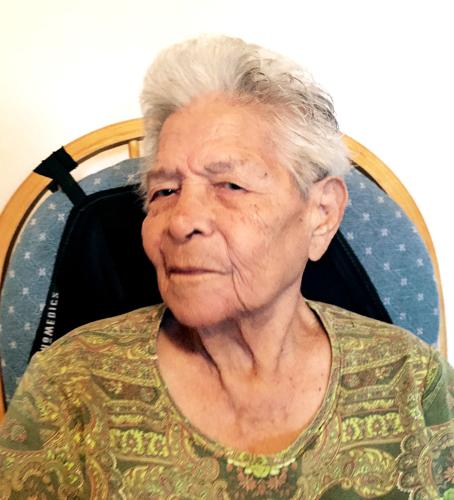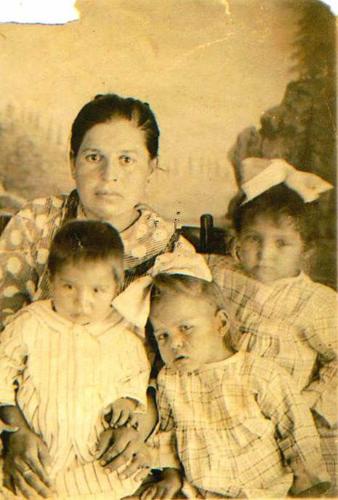Maria Cruz Gallego Badilla was born in Tucson, but grew up on a ranch that her parents homesteaded south of town, the same year she was born. She was the second oldest of 12 surviving children born to her parents, Florenico Gallego, a Tucson native, and Mercedes Villa Gallego, who was born in Ures, Sonora.
On the 640-acre El Ocotillo ranch, near West Twin Buttes and South Mission roads, west of Sahuarita, Badilla learned the ranching ways. She cared for her younger siblings, and learned to brand calves and make cheese. She traveled to Tucson on a horse-drawn cart, and she and other children from the neighboring ranches went to a small school house called Zinc.
Badilla, who last month celebrated her 100th birthday, is full of memories. But those memories are locked inside, because she has Alzheimer’s.
“Everything,” she responded in Spanish when she was asked what she loved the most about growing up on the ranch. But when she was asked the name of the other ranches she lived on, she responded in English, “I don’t remember.”
Thursday I visited Badilla, who lives with her 76-year-old daughter, Mary Quihuis, in her home near West Ajo Way and South Mission Road. Also visiting were Badilla’s sister, Delia G. Barredo, 85, and Badilla’s niece, Cecelia Rivera, and grandson, Ernesto Montaño.
They talked about Badilla’s life and family history — and the challenges of caring for her.
Badilla can remember some of her childhood and her years married to Jesus Badilla, but she can’t remember what she did yesterday, her family said.
“She won’t remember us sitting here,” said her grandson.
If Badilla could recall her long life, oh, what stories she could tell.
She was born on South Meyer Avenue, in the home of her grandparents, Casimiro and Antonia Gallego, in Barrio Viejo. The house still stands across from the old Jerry Lee Ho Market. It was 1916. World War I had engulfed Europe, and the Mexican Revolution was sending thousands of refugees north.
In her first 18 years, Badilla’s life was on the ranch. Cooking, sewing and tending to the younger children and the animals consumed her time. It also prepared her for a second life when she married Badilla, a cowboy who worked for Howell Manning Jr., whose family owned the Canoa Ranch, about 25 miles south of Tucson.
During her marriage, she and her four children followed her husband to other Tucson-area ranches, where he broke horses. She cooked for the roundups. She gardened. She sewed and knitted.
“And she made the best tortillas,” said her sister, Delia. “She was a very busy lady.”
The Badillas also built a home in South Tucson, where she went to live in 1977, two years after her husband died. There she continued to keep busy, cooking for the 10 grandchildren and tending to her garden in the backyard, where she also raised a calf.
Tuchi, as she was called by her family, tooled around town in a ‘73, baby blue Ford F-150 pickup truck, said Montaño.
She always had something to do, said Badilla’s niece, adding that her Tía Tuchi was athletic, creative, talented, and “always made sure everyone was taken care of.”
The caretaker role began to reverse itself seven years ago when Badilla moved in with her daughter. Tuchi was healthy, but the family didn’t want her living alone now that she was in her 90s.
Badilla was beginning to show signs of her mental deterioration. She repeated her questions. Her memory was failing. There were other markers.
Two years ago, Badilla, who has 16 great-grandchildren and seven great-great grandchildren, was diagnosed with dementia. In October the diagnosis was Alzheimer’s.
“It just came all of a sudden,” said Quiroz, her mother’s primary caregiver.
She and the family are learning how to care for Tuchi, who smiled and whose body shook during our visit. She has a walker, but sometimes insists on not using it. She recently fell, hurting her head. It wasn’t her first fall, either.
Tuchi’s condition challenges and saddens the family, which includes two brothers, Armando and Mike Gallego.
Her grandson’s eyes filled with tears when I asked him how he deals with her condition. Her sister, Delia, said it’s hard to see her strong sister, who was like a second mother, like this. Quiroz said her mother is stubborn, but understands she needs to be patient.
The family clearly understands its role.
“This is our turn to help,” said Rivera.






